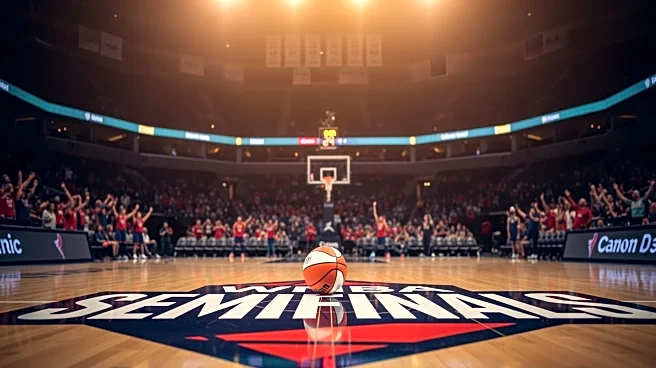What's Happening?
The Indiana Fever's unexpected journey to the WNBA Semifinals in 2025 has captured significant attention, despite the absence of key players like Caitlin Clark due to injuries. The Fever's games against
the Las Vegas Aces drew impressive TV ratings, with Game 3 and Game 4 each averaging 1.4 million viewers on ESPN, and Game 5 reaching 1.83 million viewers on ESPN2. This series became the most-watched WNBA semifinals ever, averaging 1.56 million viewers. Fever star Sophie Cunningham highlighted the team's impact on these ratings during her podcast, noting the Fever's games were viewed more than the Finals games.
Why It's Important?
The high viewership of the Indiana Fever's semifinals series underscores the growing popularity of the WNBA and the Fever's strong fan base. This surge in ratings reflects increased interest in women's basketball, potentially leading to greater investment and sponsorship opportunities for the league. The Fever's ability to draw such large audiences, even without their star player Caitlin Clark, demonstrates the team's appeal and the league's expanding reach. This could influence future broadcasting deals and marketing strategies, benefiting the WNBA's growth and visibility.
What's Next?
As the WNBA continues to gain traction, the league may explore new avenues for expanding its audience and enhancing its media presence. The Fever's success in attracting viewers could lead to more televised games and increased promotional efforts. Additionally, the league might consider strategies to capitalize on this momentum, such as engaging with fans through social media and community events. The Fever's performance could also inspire other teams to focus on building strong fan bases and leveraging media coverage to boost their profiles.
Beyond the Headlines
The Fever's impact on WNBA ratings highlights broader cultural shifts towards greater recognition and support for women's sports. This trend may encourage more young athletes to pursue careers in basketball, fostering diversity and talent in the sport. The Fever's success could also prompt discussions about gender equity in sports, advocating for equal opportunities and resources for female athletes. As the WNBA continues to grow, it may play a pivotal role in shaping societal attitudes towards women's sports and promoting inclusivity.









